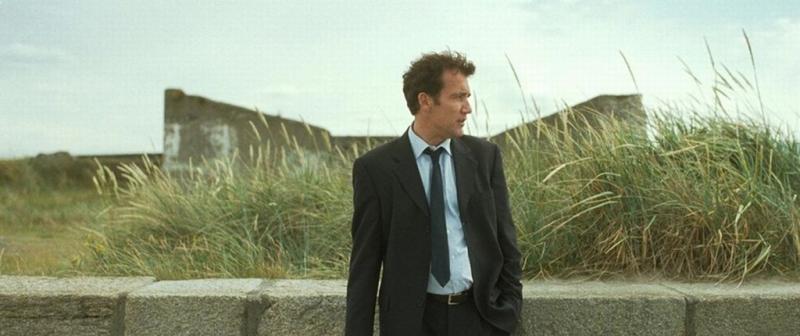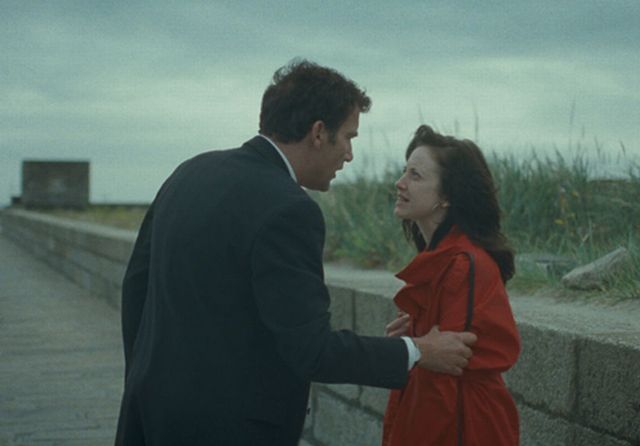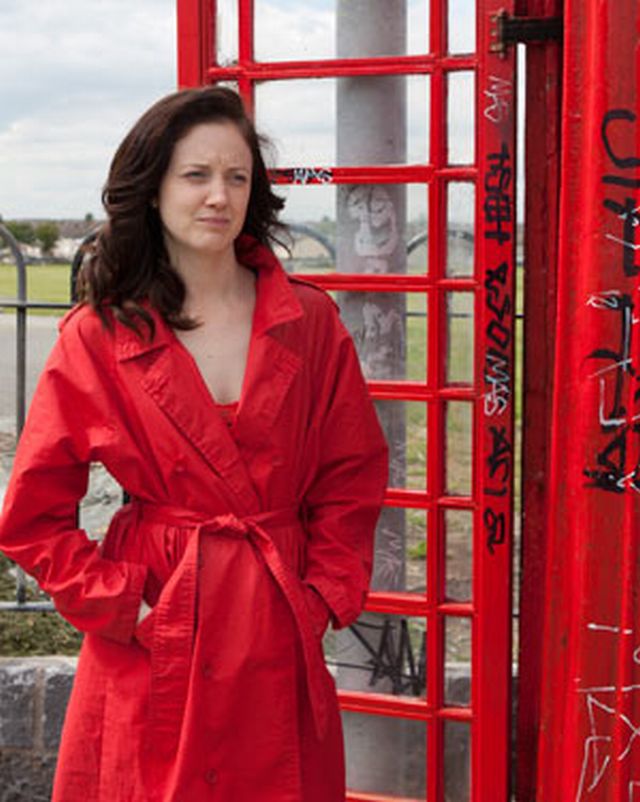Shadow Dancer | reviews, news & interviews
Shadow Dancer
Shadow Dancer
James Marsh's IRA-themed thriller is muted, merciless - and brilliant

There's not exactly an excess of colour in Shadow Dancer, the IRA-themed thriller that unfolds amid a bleached-out landscape of browns and greys, windswept waterfronts and drab, unwelcoming enclosures.
 Part of the appeal comes from two leads, Andrea Riseborough and Clive Owen (pictured right), whom one could imagine having a high old celluloid time in some contrastingly fetching romcom, or the like. Instead, the two circle one another intently yet warily, coming together for moments of complicity and possibly something more yet pulling away as required by the exigencies of a climate in which bloodshed conquers all. The result melds the personal and the political into one encompassingly grievous whole, with the invaluable Brid Brennan on hand in a supporting role to lift proceedings very nearly to the level of Greek tragedy.
Part of the appeal comes from two leads, Andrea Riseborough and Clive Owen (pictured right), whom one could imagine having a high old celluloid time in some contrastingly fetching romcom, or the like. Instead, the two circle one another intently yet warily, coming together for moments of complicity and possibly something more yet pulling away as required by the exigencies of a climate in which bloodshed conquers all. The result melds the personal and the political into one encompassingly grievous whole, with the invaluable Brid Brennan on hand in a supporting role to lift proceedings very nearly to the level of Greek tragedy.
Owen plays Mac, a truculent MI5 operative who sets about making an informer out of Riseborough as a young Belfast mum, Colette McVeigh, a violence-scarred child first encountered in adulthood delivering what appears to be a bomb on to a London tube ca.1993. (Her baby brother, we see at the very start, was shot dead 20 years earlier in the sectarian crossfire while on a routine visit to the corner store that Colette's father had in fact asked his daughter to make.)
 Now grown, that grievous day from her past seared on the memory, Colette is the lone sister in a family of Republican hard-liners. Domhnall Gleeson and Aidan Gillen bring flinty, fierce authority to the parts of those other brothers busily asserting their seniority within the IRA, while Brennan movingly underplays the wild-eyed matriarch who has seen it all but is powerless to arrest the cycle of carnage that risks catching even so baleful a figure of compassion in its grip.
Now grown, that grievous day from her past seared on the memory, Colette is the lone sister in a family of Republican hard-liners. Domhnall Gleeson and Aidan Gillen bring flinty, fierce authority to the parts of those other brothers busily asserting their seniority within the IRA, while Brennan movingly underplays the wild-eyed matriarch who has seen it all but is powerless to arrest the cycle of carnage that risks catching even so baleful a figure of compassion in its grip.
What comes first: allegiance to family or to the cause, Colette's love for her own traumatised son or filial dictates virtually demanding that someone or other will not make it through to morning? Mac's own challenge is to try to gain access and information while rescuing Colette from a fate that seems preordained. (Gillian Anderson is in fine, steely form as Mac's boss.) And if Mac and Colette's relationship evolves in the process, that's as it must be, too, even if one isn't immediately sure whether the pair represent lovers waiting to happen or the father/daughter scenario that Colette, in particular, has needed her entire life.
Enacting a cat-and-mouse scenario of ever-increasing stakes, the two leads work well separately and together, Mac's private life irrelevant to the singular focus of screenwriter Tom Bradby's tale. (The source for the film is journalist Bradby's 2001 novel of the same name.) Instead, we come to understand Colette from all perspectives, Riseborough calbrating the pressures attendant upon the various people, and parties, that stake undue claim on her emotions - and time.
The narrative leads its principals into a climactic face-off that, were this the theatre, would have the audience on its feet. (In fact, the duo would be ideal casting should anyone decide to revive the blistering David Harrower two-hander, Blackbird.) At the press screening I attended, the cinephiles in the room did the next best thing: they stayed pinned to their seats as the final credits rolled.
Watch the trailer for Shadow Dancer
rating
Explore topics
Share this article
The future of Arts Journalism
You can stop theartsdesk.com closing!
We urgently need financing to survive. Our fundraising drive has thus far raised £33,000 but we need to reach £100,000 or we will be forced to close. Please contribute here: https://gofund.me/c3f6033d
And if you can forward this information to anyone who might assist, we’d be grateful.

Subscribe to theartsdesk.com
Thank you for continuing to read our work on theartsdesk.com. For unlimited access to every article in its entirety, including our archive of more than 15,000 pieces, we're asking for £5 per month or £40 per year. We feel it's a very good deal, and hope you do too.
To take a subscription now simply click here.
And if you're looking for that extra gift for a friend or family member, why not treat them to a theartsdesk.com gift subscription?
more Film
 DVD/Blu-ray: In a Year of 13 Moons
UK disc debut for Fassbinder's neglected, tragic, tender trans tale
DVD/Blu-ray: In a Year of 13 Moons
UK disc debut for Fassbinder's neglected, tragic, tender trans tale
 The Amateur review - revenge of the nerd
Remi Malek's computer geek goes on a cerebral killing spree
The Amateur review - revenge of the nerd
Remi Malek's computer geek goes on a cerebral killing spree
 Holy Cow review - perfectly pitched coming-of-age tale in rural France
Debut feature of immense charm with an all-amateur cast
Holy Cow review - perfectly pitched coming-of-age tale in rural France
Debut feature of immense charm with an all-amateur cast
 Patrick McGilligan: Woody Allen - A Travesty of a Mockery of a Sham review - New York stories
Fair-minded Woody Allen biography covers all bases
Patrick McGilligan: Woody Allen - A Travesty of a Mockery of a Sham review - New York stories
Fair-minded Woody Allen biography covers all bases
 Blu-ray: Yojimbo / Sanjuro
A pair of Kurosawa classics, beautifully restored
Blu-ray: Yojimbo / Sanjuro
A pair of Kurosawa classics, beautifully restored
 Mr Burton review - modest film about the birth of an extraordinary talent
Harry Lawtey and Toby Jones excel as the future Richard Burton and his mentor
Mr Burton review - modest film about the birth of an extraordinary talent
Harry Lawtey and Toby Jones excel as the future Richard Burton and his mentor
 Restless review - curse of the noisy neighbours
Assured comedy-drama about an ordinary Englishwoman turned vigilante
Restless review - curse of the noisy neighbours
Assured comedy-drama about an ordinary Englishwoman turned vigilante
 Ed Atkins, Tate Britain review - hiding behind computer generated doppelgängers
Emotions too raw to explore
Ed Atkins, Tate Britain review - hiding behind computer generated doppelgängers
Emotions too raw to explore
 Four Mothers review - one gay man deals with three extra mothers
Darren Thornton's comedy has charm but is implausible
Four Mothers review - one gay man deals with three extra mothers
Darren Thornton's comedy has charm but is implausible
 Misericordia review - mushroom-gathering and murder in rural France
A deadpan comedy-thriller from the director of ‘Stranger by the Lake’
Misericordia review - mushroom-gathering and murder in rural France
A deadpan comedy-thriller from the director of ‘Stranger by the Lake’
 theartsdesk Q&A: filmmaker Joshua Oppenheimer on his apocalyptic musical 'The End'
The documentary director talks about his ominous first fiction film and why its characters break into song
theartsdesk Q&A: filmmaker Joshua Oppenheimer on his apocalyptic musical 'The End'
The documentary director talks about his ominous first fiction film and why its characters break into song
 DVD/Blu-ray: The Substance
French director Coralie Fargeat on the making of her award-winning body-horror movie
DVD/Blu-ray: The Substance
French director Coralie Fargeat on the making of her award-winning body-horror movie

Add comment